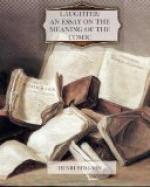We have shown that the comic character always errs through obstinacy of mind or of disposition, through absentmindedness, in short, through automatism. At the root of the comic there is a sort of rigidity which compels its victims to keep strictly to one path, to follow it straight along, to shut their ears and refuse to listen. In Moliere’s plays how many comic scenes can be reduced to this simple type: A character following up his one idea, and continually recurring to it in spite of incessant interruptions! The transition seems to take place imperceptibly from the man who will listen to nothing to the one who will see nothing, and from this latter to the one who sees only what he wants to see. A stubborn spirit ends by adjusting things to its own way of thinking, instead of accommodating its thoughts to the things. So every comic character is on the highroad to the above-mentioned illusion, and Don Quixote furnishes us with the general type of comic absurdity.
Is there a name for this inversion of common sense? Doubtless it may be found, in either an acute or a chronic form, in certain types of insanity. In many of its aspects it resembles a fixed idea. But neither insanity in general, nor fixed ideas in particular, are provocative of laughter: they are diseases, and arouse our pity.
Laughter, as we have seen, is incompatible with emotion. If there exists a madness that is laughable, it can only be one compatible with the general health of the mind,—a sane type of madness, one might say. Now, there is a sane state of the mind that resembles madness in every respect, in which we find the same associations of ideas as we do in lunacy, the same peculiar logic as in a fixed idea. This state is that of dreams. So either our analysis is incorrect, or it must be capable of being stated in the following theorem: Comic absurdity is of the same nature as that of dreams.
The behaviour of the intellect in a dream is exactly what we have just been describing. The mind, enamoured of itself, now seeks in the outer world nothing more than a pretext for realising its imaginations. A confused murmur of sounds still reaches the ear, colours enter the field of vision, the senses are not completely shut in. But the dreamer, instead of appealing to the whole of his recollections for the interpretation of what his senses perceive, makes use of what he perceives to give substance to the particular recollection he favours: thus, according to the mood of the dreamer and the idea that fills his imagination at the time, a gust of wind blowing down the chimney becomes the howl of a wild beast or a tuneful melody. Such is the ordinary mechanism of illusion in dreams.
Now, if comic illusion is similar to dream illusion, if the logic of the comic is the logic of dreams, we may expect to discover in the logic of the laughable all the peculiarities of dream logic. Here, again, we shall find an illustration of the law with which we are well acquainted: given one form of the laughable, other forms that are lacking in the same comic essence become laughable from their outward resemblance to the first. Indeed, it is not difficult to see that any play of ideas may afford us amusement if only it bring back to mind, more or less distinctly, the play of dreamland.




